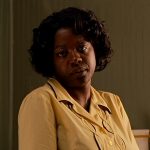The Help – 2011
This review has to start off with a big round of applause for Viola Davis and Octavia Spencer. These two women did a fantastic job in this period piece that examined a very specific kind of racism in 1962 in Jackson, Mississippi. It is important to note that some critics were upset that we weren’t treated to a dark and disturbing film about social, financial, physical, mental, and sexual abuse endured by the maids because that’s how things really were.
But that isn’t the movie that director Tate Taylor was making. That’s a different film with a different feel and a different aesthetic. So we got a little comedy, a little drama, and an entertaining peripheral glimpse into a time and place in history, about which most people are ignorant. They weren’t trying to make a hard-hitting drama. And I know, the movie wasn’t as good as the book, but it’s OK. It never is.
The Help is about three women who were brave enough to fight back against racism and abuse during the time of the Civil Rights movement. Davis played Aibileen Clark, a black woman working as a maid for a rich white family who, like all the other rich white families in Jackson, treated the help as little more than a slave. Minny Jackson, played by Spencer, also a maid, and after being fired for using the wrong bathroom, cooks up a horrible bit of revenge. Emma Stone, playing the part of Skeeter Phelan, a young white woman who wants to be a professional writer convinces Aibileen and Minny to tell their terrible stories in the form of a book called The Help, implicating their overprivileged employers in acts of extreme racism.
All three of them did a fantastic job, but I have to give Viola Davis the real props. She was incredible. She was arguably the film’s protagonist, though that title might also apply to Skeeter, as she was the driving force behind the writing of the aforementioned book. Davis had a powerful character arch and an undeniable gravitas that was impressive. She really stood out as a phenomenal actress. But it was Spencer who took home an Oscar for Best Supporting Actress instead of Davis. True, Spencer deserved it, but I think Davis might have deserved it more.
Now, whenever I think of this film, the first thing that comes to mind is the infamous pie scene. Minny’s gets her revenge by making her former employer, Hilly Holbrook, played by Bryce Dallas Howard, a pie. She takes it to Hilly, calling it an apology. Hilly eats two slices before being told that it contained Minny’s… poo! What made she scene hilarious was that Hilly’s mother, played by Sissy Spacek, was watching her daughter eat the pie. When the truth is revealed, Mrs. Walters starts laughing hysterically, while Minny runs away. I was laughing out loud.
There was a wonderful sub-plot in the film, concerning Minny’s new employer, Celia Rae Foote, played by Jessica Chastain. She was a white woman who was a social pariah. She can’t cook or clean, and only has a husband because she got pregnant out of wedlock. Her handsome husband Johnny, played by Mike Vogel, is a good man who is generally away at work. Minny can’t get a job because of Hilly’s influence over the other white women, but Celia Rae takes her in, befriends her, and together, the two of them help each other to thrive.
But the real drama of the story concerns Aibileen. Her story about her son’s cruel death, which goes into Skeeter’s book, is heartbreaking. And it is through her courage and the friendship which develops between the two women, that all the racist skeletons are brought out of the closet. And the final scene of the movie in which Hilly convinces Aibileen’s employer to fire her based on false accusations, was both heart-wrenching and uplifting. She shames Hilly, calling her a godless woman who will never know peace, then proudly walks out, holding her head high.
I also have to mention wonderful performances from Allison Janney, playing Charlotte, Skeeter’s mother who is battling cancer, Chris Lowell, playing Stuart Whitworth, Skeeter’s racist boyfriend, and Ahna O’Reilly as Elizabeth Leefolt, Hilly’s friend and Aibileen’s employer. All of them, especially Janney did a great job. But I also have to mention one little performance that had me rolling my eyes a little. The small part of Mr. Blackly was played by gay comedian, Leslie Jordan. I’m sorry Leslie. I know you tried, but I didn’t buy your act straight for a minute.
Either way, the movie was good. The villans, the wealthy white women who were always pretty and smiling, tried to hide their vicious racism beneath a veneer of girlish sweetness. Even in this comical, softened version of reality, their behavior was almost sickening to watch, just as the courage of the Skeeter and the two maids was uplifting. This was just a well-made and entertaining film.








